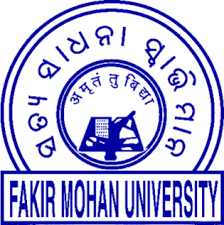General Information
Fakir Mohan University, located in Balasore, Odisha, stands as an important public State University. Established relatively recently in 1999 by the Government of Odisha, it was carved out of Utkal University to specifically cater to the higher education needs of the northern districts, primarily Balasore and Bhadrak. It's named after the renowned Odia writer Fakir Mohan Senapati, often considered the father of modern Odia literature.
Its mission is centered on providing accessible quality education, promoting research relevant to the region's needs (including coastal studies, social sciences, and literature), and contributing to the development of North Odisha. It functions as both a teaching university offering postgraduate and research programs on its campus and as an affiliating university for numerous colleges within its jurisdiction.
Key Recognitions:
Established by an Act of the Odisha State Legislature.
Recognized by the University Grants Commission (UGC) under Section 12(B).
Accredited by the National Assessment and Accreditation Council (NAAC) with a 'B+' Grade.
Holds necessary approvals from relevant professional bodies like AICTE (for specific Management/Technical courses), NCTE (Education), etc., for programs offered on campus or via affiliation.
MCI Recogination
Permitted for 100 seats for renewal of permission u/s 10(A) for 2020-21, Permitted for Renewal of 100 seats for the academic year 2022-23. Recognized for one (01) year for 2022-23 only. Permitted for admission for 2023-24. Annual renewal permission granted for 100 MBBS seats for AY 2024-25
Campus Facilities
The Campuses: Nuapadhi & Old Campus
FM University operates primarily from two campuses in Balasore.
Nuapadhi Campus (New Campus): This is the main, larger campus located slightly outside Balasore town. It houses most of the postgraduate teaching departments, administrative offices, hostels, and central facilities. It's known for its relatively open and developing environment.
Old Campus (In Balasore Town): The original campus likely still hosts some specific departments or administrative functions.
Campus Vibe: The main Nuapadhi campus offers a focused academic atmosphere typical of a regional state university, set away from the city center.
Infrastructure & Facilities:
Academic Departments: Buildings housing various PG departments (Arts, Science, Commerce, Management, etc.).
Library: A central library with a growing collection of books, journals, e-resources, and reading facilities.
Laboratories: Equipped labs supporting practical work in science disciplines (Physics, Chemistry, Biosciences, Environmental Science, Geosciences), Computer Science, etc.
Learning Spaces: Lecture halls, seminar rooms, classrooms.
Hostels: Residential facilities are available on the Nuapadhi campus.
Amenities: Administrative offices, potentially a basic health center, canteen, bank counter/ATM, computer center.
Hospital & Medical Facilities
Leading tertiary care hospital attached to the institution
Healthcare Connection: Focus on General & Technical Academics
Fakir Mohan University does not have its own constituent Medical College offering the MBBS degree, nor does it operate a large general teaching hospital. Its academic strengths lie in Arts, Sciences, Commerce, Management, and Education. Medical colleges in the Balasore region (like Fakir Mohan Medical College and Hospital) function under the state's health university system (Odisha University of Health Sciences, if fully implemented) or were previously affiliated for degree purposes but are administratively distinct. The university likely provides basic first-aid through an on-campus health unit.
Fee Structure
State University Affordability
Fee Structure: State University Affordability
Being a state university, FM University's fees for regular, government-aided programs offered directly on campus are generally very affordable. Self-financed courses have higher fees.
City Details
Hostel & Mess
Campus Living: Hostel Life at Nuapadhi
FM University provides residential facilities for students enrolled in its on-campus (mostly PG) programs.
Availability: Yes, the university has separate hostels for boys and girls, primarily located on the Nuapadhi campus. Allotment is usually based on merit, category, and distance.
Facilities: Hostels offer basic furnished accommodation (often shared rooms), common rooms, dining halls (messes), security, warden supervision, and essential amenities.
Mess System: Each hostel typically operates its own mess providing regular meals, often featuring regional Odia cuisine, managed on a dividing or fixed-rate system.
Cost: As a state university, the combined cost for hostel accommodation and basic mess food is generally very affordable. Expect the total annual charges to be highly economical, likely falling in the ₹15,000 - ₹30,000 range (Needs precise confirmation from the hostel authorities).
Miscellaneous
Admissions & Career Pathways: CPET and Regional Focus
Getting Admitted:
University Entrance Test (Common PG Entrance - CPET Odisha): Admission to almost all Postgraduate (PG) courses (MA, MSc, MCom, MBA, MCA, M.Ed, etc.) offered directly by FM University departments is typically through the Common PG Entrance Test (CPET) conducted by the Odisha State Higher Education Council. Candidates apply centrally via SAMS Odisha and give university/subject preferences based on their CPET rank during counselling.
Affiliated Colleges (UG/PG): Admissions to UG courses (BA, BSc, BCom) and some PG courses in affiliated colleges are largely managed through the SAMS (Student Academic Management System) portal run by the Odisha Higher Education Department, based primarily on merit in the qualifying examination (Class 12/Graduation).
B.Ed: Admission is through the Odisha B.Ed Entrance Test.
Ph.D.: Admission involves a University Entrance Test followed by interviews/viva-voce. NET qualified candidates are often exempted from the test.
Always follow the official FM University admission notifications and Odisha State Higher Education Council (SAMS/CPET) websites for the latest procedures.
Career Support (Placements):
Focus: FM University likely has a placement cell, focusing on connecting students with opportunities, particularly relevant to the region. Career paths for many graduates often lead towards state government jobs, teaching positions (School/College level after B.Ed/NET/Ph.D.), roles in regional industries, or pursuing further academic research.
Campus Placements: Direct campus placements might occur for professional courses like MBA or MCA. Recruiters would likely include regional companies, banks, IT service firms targeting Tier 2/3 cities, educational institutions, and NGOs operating in North Odisha.
Outcomes: Placement success varies. Average packages from campus drives are expected to be modest, potentially in the ₹2 LPA to ₹4 LPA range. The university plays a crucial role in developing human resources for the North Odisha region and preparing students for competitive state-level examinations.
Information for NRI / Foreign Nationals
State universities in regional locations like Fakir Mohan University typically have limited specific provisions for NRI/Foreign Nationals compared to central or large private universities.
General Policy: FM University, as a State University primarily serving the regional population, likely does not have a dedicated, reserved NRI quota or extensive mechanisms for admitting foreign nationals into its regular programs. Admissions are governed by Odisha state domicile rules and standard Indian constitutional reservations.
Possibility for Specific Schemes: Admission might be possible through specific Government of India scholarship schemes (like ICCR) if the university is approved under such programs, or potentially on supernumerary seats if specific university regulations permit, likely requiring direct application and potentially higher fees.
Recommendation: Given the university's nature and typical admission practices, a standard NRI channel is improbable. The most reliable action is direct inquiry. Contact the FM University admission office or the Chairman, PG Council. Ask explicitly if any provision exists for NRI/Foreign National admissions for your course of interest, detailing the eligibility, required documentation, procedure, and fee structure.
Collage Images Gallery
Facilities & Campus Life
Well-equipped Library
Experienced Faculty
Computer Lab
Sports Activities
Heritage Campus
Frequently Asked Questions
Why Consult With Us?
- 15+ years of experience in medical education counseling
- 5000+ students successfully guided
- 50+ partner universities worldwide
- Free initial consultation with no obligation














